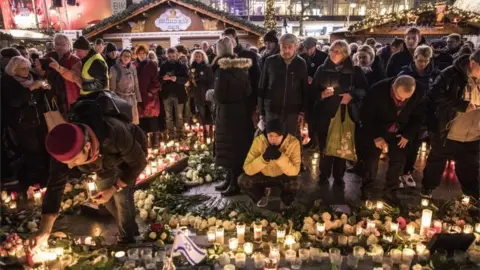MI5 warnings on Brexit, terror and Russia
 EPA
EPAMI5 has had to reassure its European partners about co-operation since the Brexit referendum, the head of the security service says, but the twin fears of terrorism and Russia has meant that European countries still want the UK's help.
With a marked increase in the number of attacks in Europe, the committee said the government should be more forthcoming on any potential risks associated with Britain leaving the EU.
The annual report of the Intelligence and Security Committee provides the most detailed overview of the work of Britain's spy agencies.
The committee, chaired by Dominic Grieve MP, said that the last two years had seen a rise in attacks in Europe leading to questions over the capability of some countries to deal with the threat.
That had led to closer co-operation between different intelligence and security services.
European mechanisms played an essential role in the UK's national security, the committee said, and it urged the government to outline its assessment of the risks of the UK's departure from the EU and the measures it is putting in place.
'Common concern'
One question the committee asked head of MI5 Andrew Parker was whether he was confident that Brexit would not have an impact on counter-terrorist work.
"Yes and no," he replied. "There are two parts to this.
"My life has got more difficult since the referendum because of the need to invest reassurance time with all of our European partners, but the thing that is driving the quality of those relationships currently is the darkness of the threat and the common concern about it.
"Half of Europe is scared of terrorism and the other half is scared of Russia and both halves want us to help them."
Mr Parker said this would not change with Brexit since much of the national security work was outside of the EU anyway.
However, he said his "hesitancy" was because there were certain issues which were within EU competence and might be affected by the negotiations, in particular those that relate to data-sharing across borders.
 PA
PAA witness from GCHQ also said it had concerns as to how European data-sharing would work after Brexit with the likely need for some kind of arrangement to share data in a way which accords with European privacy concerns.
"That's a policy issue way beyond intelligence, actually, but it will have big implications for us, so getting that right is important," the individual told the committee.
MI5 said the most striking shift in counter-terrorist work in the last five years was the rise in what is called "high-risk casework" - referring to individuals who have received terrorist training or are attempting to procure the means to carry out an attack, but who may not yet have a current attack plan.
It is also estimated that more than 300 UK individuals who went to join so-called Islamic State remained in the Middle East and might pose a threat if they returned to the UK.
Overall, it is thought 6,000 European fighters travelled out to fight with IS.
The annual report also points to the breadth of concerns for the agencies.
MI5 told the committee that Northern Ireland represents the "most concentrated area of terrorist activity probably anywhere in Europe", with terrorist activity disrupted on a weekly basis.
Dissident republicans conducted 16 attacks on national security targets in 2015/16, they say.
'Formidable adversaries'
Northern Ireland-related terrorism accounted for about 18% of MI5's operational and investigative resources. 64% is devoted to what is called international counter-terrorism (largely Islamist-related activity from groups like IS and al-Qaeda).
MI5's work on hostile state activity, including counter-espionage, counterproliferation and protective security, accounts for around 18% of its effort.
Russia has risen up the list of priorities in recent years.
MI6 described the Russian state as "formidable adversaries" to the committee.
"They clearly are operating to risk thresholds which are nothing like those that the West operates," MI5 said.
Officials described a number of steps taken to protect the UK's political system from the kind of attack allegedly seen in 2016 in the US, including tracking the major known perpetrators and ensuring individuals involved in politics had access to security advice.
So far there are few signs of the close working relationship with the US being affected by the Trump administration, the committee says, although the agencies are aware of the potential risks, especially if campaign talk of returning to waterboarding of detainees was to actually become policy.
"Any significant change in US policies relating to detainee treatment would pose very serious questions for the UK-USA intelligence relationship," MI6 said.
One other revelation came in the report.
MI6 - which spent £798,000 on external consultants to review its structure - is increasing accommodation through refurbishment of Vauxhall Cross. And for Britain's spies, that means they will have to start hot-desking.
